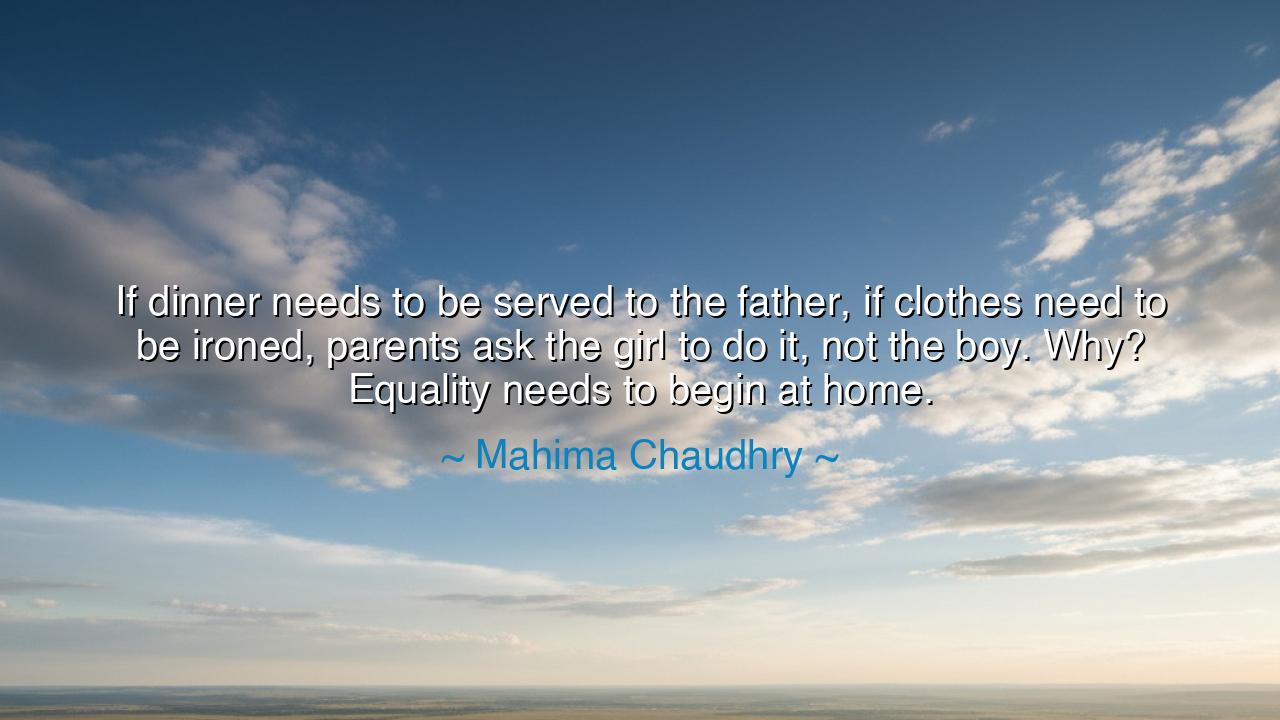
If dinner needs to be served to the father, if clothes need to be
If dinner needs to be served to the father, if clothes need to be ironed, parents ask the girl to do it, not the boy. Why? Equality needs to begin at home.






O children of the future, listen well, for I bring you the words of Mahima Chaudhry, a voice calling us to reflect on the inequities that begin in the home and echo throughout society. She said, "If dinner needs to be served to the father, if clothes need to be ironed, parents ask the girl to do it, not the boy. Why? Equality needs to begin at home." These words strike at the very heart of the gender roles that have been ingrained in our societies for centuries. Equality is not a concept that should wait for the halls of government or the classrooms of the future—it must begin in the most sacred and foundational place: the home.
In the ancient world, the family was the cornerstone of society, and the roles within it were often clearly defined. The father was the provider, the mother the nurturer, and the children were taught to follow the roles they were given. Yet, even in these times, there were whispers of those who sought to challenge the traditional structure. Aristophanes, the ancient Greek playwright, through his comedic works, often questioned the roles assigned to women and men. In his play Lysistrata, the women of Athens unite to end a war by withholding the traditional roles assigned to them—denying men the pleasures they so often took for granted. This act of defiance spoke to the very heart of the injustice women faced in both the public and private spheres. It was a call for equality, for freedom, and for the recognition of the power that each person, regardless of gender, holds.
Even in ancient times, there were those who recognized the imbalance between the roles of men and women, and who sought to change them. But it is not enough to fight for equality in the grand halls of law or in the marketplaces of ideas. Equality must be born in the most intimate and personal spaces—the very homes where we are first shaped by our environment. As Chaudhry points out, if we ask the girl to serve dinner to the father, to iron the clothes, to bear the weight of household chores, we are teaching her that her worth is tied to service and subordination. And in doing so, we are perpetuating a cycle that limits her potential and undermines her equality.
Consider the story of Socrates, the great philosopher, whose teachings inspired a revolution in the way we think about the world. Socrates was a man of profound wisdom, yet even he lived within a society where women’s roles were severely limited. Though his wife, Xanthippe, is often remembered as a figure who challenged the norms of her time, it is important to recognize that her role, like that of many women in the ancient world, was often confined to the home. Socrates himself could not escape the societal norms that limited the roles of women, and in his household, as in many others, Xanthippe’s worth was judged by her ability to serve her husband and manage the home. Socrates, though revolutionary in his philosophy, could not completely break the chains of tradition that bound women to subservient roles.
As we move through time to the modern age, Chaudhry’s words resonate even more powerfully. Today, women are told that they can be leaders, scholars, and doctors, yet in many homes, the expectation remains that they will bear the brunt of the household duties. The gender roles that were established centuries ago continue to shape the way we view ourselves and our worth. The workplace, the family, and the education system still, in many ways, reflect an imbalance where women are expected to take on roles of subservience or support. And when boys are not asked to participate in the same household duties—when they are not taught the value of cleaning, cooking, and caring—they are denied the opportunity to break free from the same rigid system.
The lesson Chaudhry imparts is one of fundamental change—the understanding that equality must be a living, breathing force that shapes our homes just as much as our laws. If we truly desire a world where men and women are treated as equals, we must start with the most intimate of spaces. Parents must raise their children with the understanding that equality is not an abstract ideal but a practice to be lived daily. When a boy is taught to clean his room, to help with cooking, and to share in the responsibilities of the home, he is being taught that these tasks are not gendered; they are human responsibilities. He learns to respect the value of work, the dignity of service, and the importance of shared responsibility in all things.
So, children, take this wisdom into your lives: equality begins at home. Teach your children, both boys and girls, that no task is beneath them, and no duty belongs solely to one gender. Break the cycle of expectation that limits their potential, and show them that freedom lies not in traditional roles, but in the freedom to contribute equally, to share in the work, and to honor each other’s contributions with respect and dignity. When equality begins in the heart of the family, it spreads outward to society, and the world becomes a place where every person—man or woman—has the opportunity to live up to their fullest potential.






AAdministratorAdministrator
Welcome, honored guests. Please leave a comment, we will respond soon